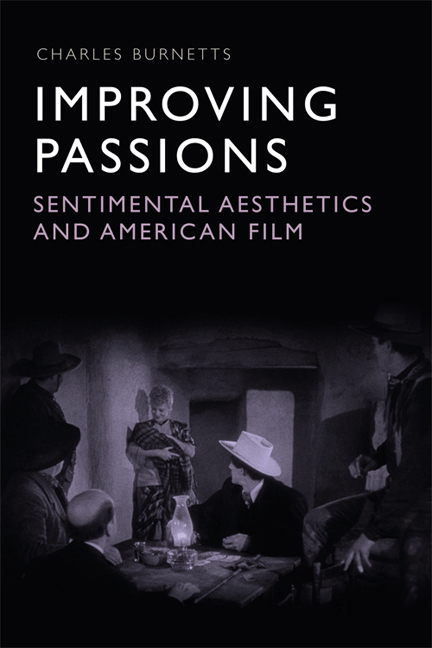Book contents
- Frontmatter
- Contents
- Acknowledgements
- Introduction
- 1 Towards a Genealogy of Sentimentalism in the Eighteenth and Nineteenth Centuries
- 2 Sentimental Aesthetics and Classical Film Theory
- 3 The Sentimental Chaplin: Comedy and Classical Narrative
- 4 Affect, or Postmodern Sentimentalism
- 5 The Sentiments of War in Spielberg and Tarantino
- 6 Sentiment and the ‘Smart’ Melodrama
- Conclusion
- Bibliography
- Index
5 - The Sentiments of War in Spielberg and Tarantino
Published online by Cambridge University Press: 20 December 2017
- Frontmatter
- Contents
- Acknowledgements
- Introduction
- 1 Towards a Genealogy of Sentimentalism in the Eighteenth and Nineteenth Centuries
- 2 Sentimental Aesthetics and Classical Film Theory
- 3 The Sentimental Chaplin: Comedy and Classical Narrative
- 4 Affect, or Postmodern Sentimentalism
- 5 The Sentiments of War in Spielberg and Tarantino
- 6 Sentiment and the ‘Smart’ Melodrama
- Conclusion
- Bibliography
- Index
Summary
This chapter seeks to examine the contours of the new sentimentalism outlined above by focusing on the rise of camp as an increasingly popular ‘reading protocol’ of Hollywood's post-classical period. Aligned with the era's hybridisation of genre, style, and attitude, camp very much characterises the mood of much ‘postmodern’ Hollywood cinema in its persistent acts of self-reference and media re-appropriation, while foregrounding ‘disinterest’ as its vital affective corollary. The discussion below focuses specifically on two treatments of combat during the Second World War: Steven Spielberg's Saving Private Ryan (1998) (hereafter SPR) and Quentin Tarantino's Inglourious Basterds (2009) (hereafter IB), and demonstrates how they can be profitably differentiated in terms of their recourse to sentimentality and camp. The purpose of such comparisons is not to evaluate the artistic merit or quality of these films, but rather to analyse and interrogate these films’ distinct appeals to emotion and moral virtue as contemporary American depictions of wartime sacrifice and trauma. It seeks not, in other words, to favour one film over the other, but rather to consider what is gained or lost by contemporary rhetorical variations in the ‘war/combat film’ (Langford 2005: 107), particularly in its post-classical phase. I argue in particular that a more traditionally sentimental film like SPR, through its reverential honouring of fallen Allied soldiers, serves to clarify the moral legitimacy of warfare in a way that still challenges the moral indeterminacies and aporia of IB's more postmodern, camper, approach. The essay speculates thus on the feasibility of IB's approach as any kind of affective alternative to SPR, while ultimately asserting the importance of understanding both films as postmodern, or post-classical, films.
A crucial emphasis relates here to the temporal dimensions of sentiment, specifically cinema's nostalgic but no less complex invocation of mythic pasts, or golden ages. Christine Gledhill has argued, for instance, that Hollywood melodrama follows a dual logic, showing what ‘is’ alongside what ‘should have been’, often doing so through affirmations of a ‘golden past’ (1987: 21).
- Type
- Chapter
- Information
- Improving PassionsSentimental Aesthetics and American Film, pp. 127 - 141Publisher: Edinburgh University PressPrint publication year: 2017



